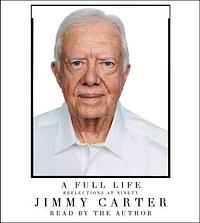Take a photo of a barcode or cover
Jimmy Carter and my grandmother both came from Georgia, and I get a hint of her when I hear President Carter's gentle old-South accent. I respect his balance between his heart-felt spiritual beliefs and the need to respect the law and others.
For instance, his account of supporting the people's legal right to an abortion while finding it morally repugnant in most cases. He reasoned that since the data showed fewer abortions were performed when mothers had adequate food, pre-natal care, and support, he pushed for the social programs required to maximize those things and hence minimize abortion. He distances himself from religious fundamentalists, and even evangelicalism because of its ties to right-wing extremists.
Nevertheless, much of Carter's presidential career appears to be reacting to one emergency or another without an overall framework for shaping global political discussion. The longer term initiatives he had were goals for responding to humanitarian disasters. This often seemed to surprise other leaders, and given the information we have from the period of his administration, led to suboptimal outcomes for US policy, but he often got human rights concessions from dictators, which has had lasting effect on the lives of millions.
For instance, his account of supporting the people's legal right to an abortion while finding it morally repugnant in most cases. He reasoned that since the data showed fewer abortions were performed when mothers had adequate food, pre-natal care, and support, he pushed for the social programs required to maximize those things and hence minimize abortion. He distances himself from religious fundamentalists, and even evangelicalism because of its ties to right-wing extremists.
Nevertheless, much of Carter's presidential career appears to be reacting to one emergency or another without an overall framework for shaping global political discussion. The longer term initiatives he had were goals for responding to humanitarian disasters. This often seemed to surprise other leaders, and given the information we have from the period of his administration, led to suboptimal outcomes for US policy, but he often got human rights concessions from dictators, which has had lasting effect on the lives of millions.
informative
reflective
medium-paced
This book is a great survey read about the life of Jimmy Carter and the main points of his presidency. I enjoyed his reflections about the low points of his presidency, and was inspired by the way he's shaped his life post-office. While I categorize it as a medium-paced read, there were definitely parts that were slow and I was tempted to skip over. Definitely one of the better presidential autobiographies I've read.
Pretty impressive life. I feel like I knew nothing of Carter.
Jimmy Carter is a saint.
I don't care how you feel about his politics. And I don't care how you feel about his evangelicalism.
Jimmy Carter is a good, good man.
He served under some pretty tough circumstances that he may or may not have poorly handled. But in every situation, I believe, he sought to do the right thing for the right reason. The United States has had some men who were successful presidents, but I doubt that there were any in the 20th Century who were as pure in heart as was Jimmy Carter.
Have I extolled him enough yet?
This autobiography, while not compelling, is insightful. He lays out each of his accomplishments in a matter-of-fact way—never with bragging or embellishing—knowing that, when they were good, they were good and he was proud of them. When speaking about his failures, you get the sense that he did everything he could to turn them around, and his humility allows him to swallow them down and move on.
Perhaps he wasn't liked because he wore his Christianity on his sleeve. It's who he was. He carried his missionary work into the cabinet meetings, the diplomacy table, and, later, into building homes. He was completely nonjudgemental of the simple father with the beer who opens his home to hear the gospel, and to the villainous despot who opens his heart to the idea of peace. He said that he felt like his life was "in the hands of God."
He speaks candidly about his relationships—with his father, Roselyn, Ted Kennedy, Barack Obama—he speaks honestly about race and civil rights, and he offers insights into major historical events of his time: one of my favorites was his struggles with Menachem Begin at Camp David and, after saying a prayer and putting on his best suit, he approached an ill-tempered Begin with the question "what can I do for you?" to which Begin requested some signed photos of the historical event to take back to his grandchildren. Carter personalized each one, touched Begin's heart, and changed the course of events. His natural inclination was always to smooth out relationships and invite the insights and help from others.
He followed the lesson he learned from his missionary companion: "You only have to have two loves in your life: for God, and for the person in front of you at any particular time." Using this as his motto, he was able to walk with both royalty and the common man. He built houses for the poor and peace centers for the powerful.
* A few notes:
Had it not been for the competitive jealousy of Ted Kennedy, the country would already have universal health care implemented by Carter back in 1979.
Jimmy Carter installed 36 solar panels at the White House, but they were removed by Ronald Reagan. (This seems petty and without any foresight.)
I don't care how you feel about his politics. And I don't care how you feel about his evangelicalism.
Jimmy Carter is a good, good man.
He served under some pretty tough circumstances that he may or may not have poorly handled. But in every situation, I believe, he sought to do the right thing for the right reason. The United States has had some men who were successful presidents, but I doubt that there were any in the 20th Century who were as pure in heart as was Jimmy Carter.
Have I extolled him enough yet?
This autobiography, while not compelling, is insightful. He lays out each of his accomplishments in a matter-of-fact way—never with bragging or embellishing—knowing that, when they were good, they were good and he was proud of them. When speaking about his failures, you get the sense that he did everything he could to turn them around, and his humility allows him to swallow them down and move on.
Perhaps he wasn't liked because he wore his Christianity on his sleeve. It's who he was. He carried his missionary work into the cabinet meetings, the diplomacy table, and, later, into building homes. He was completely nonjudgemental of the simple father with the beer who opens his home to hear the gospel, and to the villainous despot who opens his heart to the idea of peace. He said that he felt like his life was "in the hands of God."
He speaks candidly about his relationships—with his father, Roselyn, Ted Kennedy, Barack Obama—he speaks honestly about race and civil rights, and he offers insights into major historical events of his time: one of my favorites was his struggles with Menachem Begin at Camp David and, after saying a prayer and putting on his best suit, he approached an ill-tempered Begin with the question "what can I do for you?" to which Begin requested some signed photos of the historical event to take back to his grandchildren. Carter personalized each one, touched Begin's heart, and changed the course of events. His natural inclination was always to smooth out relationships and invite the insights and help from others.
He followed the lesson he learned from his missionary companion: "You only have to have two loves in your life: for God, and for the person in front of you at any particular time." Using this as his motto, he was able to walk with both royalty and the common man. He built houses for the poor and peace centers for the powerful.
"...Our government should be known to be opposed to war, dedicated to the resolution of disputes by peaceful means, and whenever possible, eager to accomplish this goal. We should be seen as the unswerving champion of human rights, both among our own citizens and within the global community. America should be the focal point around which other nations can rally against threats to equality of our common environment. We should be willing to lead by example in sharing our great wealth with those in need. Our own society should provide equal opportunity for all citizens and assure that they are provided the basic necessities of life. It would be no sacrifice in exemplifying these traits. Instead, our nation's wellbeing would be enhanced by restoring the trust, admiration, and friendship that our nation formerly enjoyed among other peoples."
* A few notes:
Had it not been for the competitive jealousy of Ted Kennedy, the country would already have universal health care implemented by Carter back in 1979.
Jimmy Carter installed 36 solar panels at the White House, but they were removed by Ronald Reagan. (This seems petty and without any foresight.)
Some interesting ideas as always. Worth reading for a different view on some international issues.
At age ninety, Jimmy Carter still has lots to share as he reflects on his life, his accomplishments, and his unresolved business.
Having never read any of Carter's previous books, I was surprised to see an extensive list of his previous works. I thought, "For a guy who has written so much about his life, what else could he offer in this book?" Whereas his other works are focused on particular points in his life, such as his time as a boy working on a farm, or his personal accounts of his years as president, this one reads as a traditional biography. He talks a little about his family's history in the beginning, his life growing up on the farm, and his roles in the world of politics. He is especially reflective of each moment of his life, and shares his thoughts in a down to earth manner that is neither condescending nor unengaging. He is quite clear, and is easy to follow along. You'll have no trouble reflecting on his life right alongside with him.
It's an interesting memoir, and it feels fully fleshed out. If you're interested in specific moments of his life, there is probably a book just for that!
Having never read any of Carter's previous books, I was surprised to see an extensive list of his previous works. I thought, "For a guy who has written so much about his life, what else could he offer in this book?" Whereas his other works are focused on particular points in his life, such as his time as a boy working on a farm, or his personal accounts of his years as president, this one reads as a traditional biography. He talks a little about his family's history in the beginning, his life growing up on the farm, and his roles in the world of politics. He is especially reflective of each moment of his life, and shares his thoughts in a down to earth manner that is neither condescending nor unengaging. He is quite clear, and is easy to follow along. You'll have no trouble reflecting on his life right alongside with him.
It's an interesting memoir, and it feels fully fleshed out. If you're interested in specific moments of his life, there is probably a book just for that!
This was interesting. I came along after Carter's presidency and admittedly didn't know much about it or him. But this was an interesting look at his life. Whatever you think of his politics, the man has done more than many could hope to accomplish. I found the vignettes on issues during his presidency to be most compelling.
This man is just a good man! I think he has done so much good for the world and we are better people because he is with us!
reflective
medium-paced
I did this as a audio book which I think made it much more enjoyable and relatable. It sort of felt as if my grandfather (if my grandfather was a famous internationally renowned Noble Price winning former president) was telling me a... I'll say coming of age story. This book contains a lot of his personal insight on Civil and Human Rights, politics, religion, and economic disparity. Highly recommended, especially the audio book.




